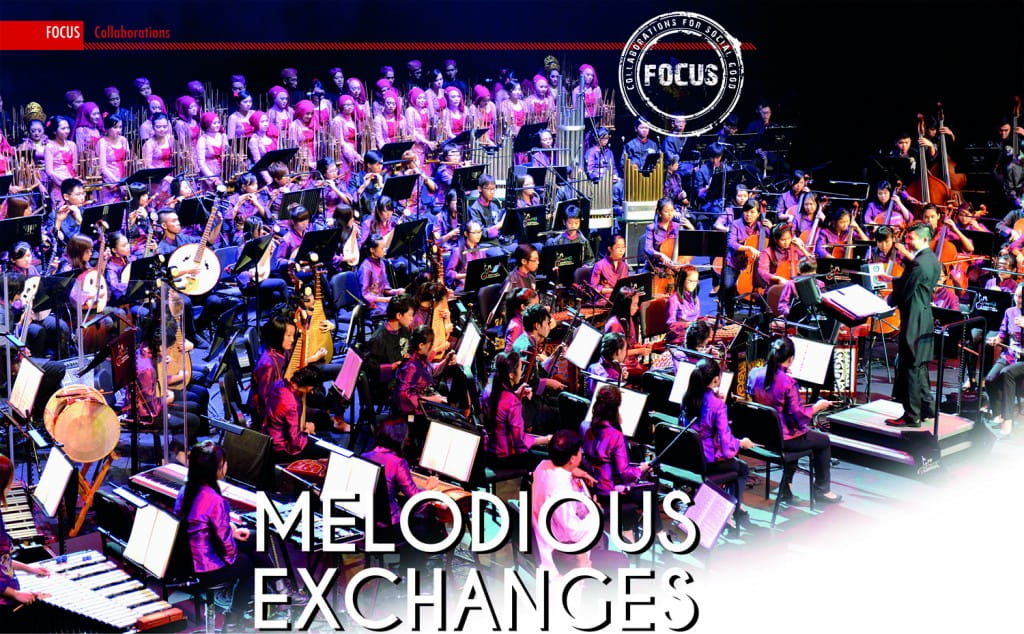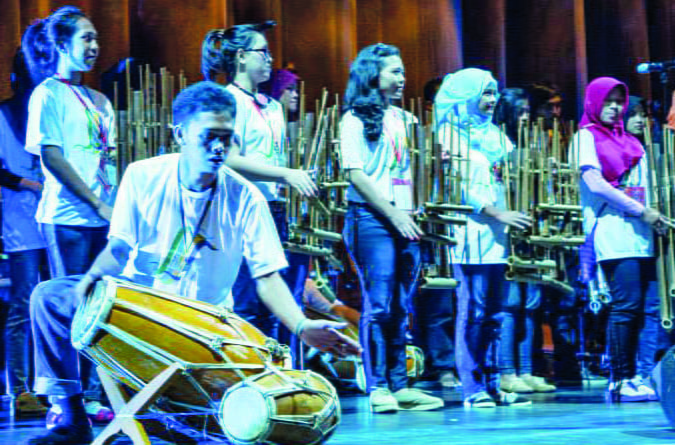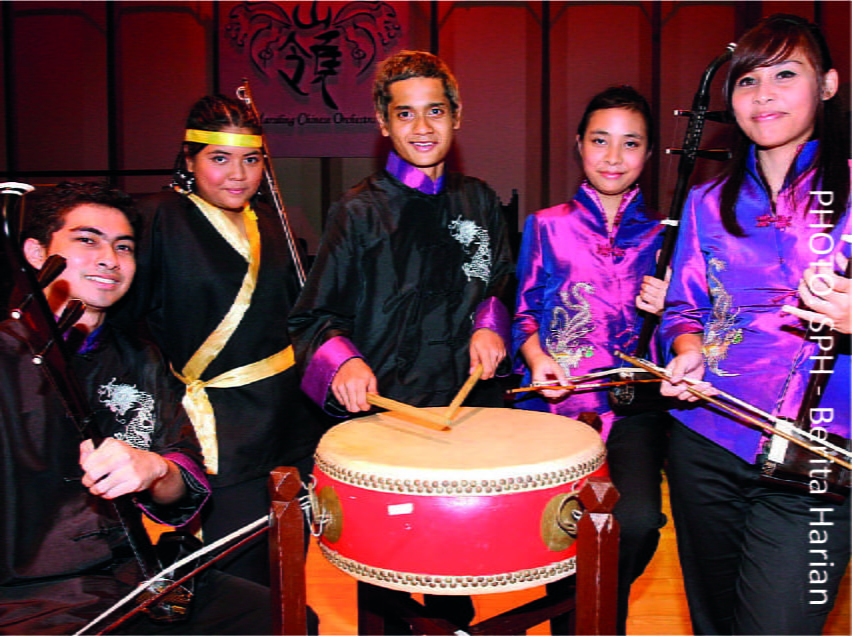
Passionate Singaporean and Indonesian musicians collaborate to present a joint concert that marries the traditional Chinese orchestra with the angklung, an Indonesian tubed instrument.
Love Across The Oceans is a musical soundscape echoing the tunes of friendships and collaboration borne from a cultural exchange programme between Singapore’s Marsiling Chinese Orchestra and the Youth Angklung Orchestra from Indonesia.
By Cynthia Chung
he familiar bold opening notes of 1980s Chinese hit song The Bund filled Singapore’s Star Performing Arts Centre on the night of 13 December 2013, its melody drawn out by members of Singapore’s Marsiling Chinese Orchestra (MCO). As members of the orchestra strummed and plucked at their pipa, guzheng and erhu among other Chinese musical instruments, another sound chimed in — the melodic vibration of the angklung, a traditional Indonesian musical instrument which consists of bamboo tubes that are shaken to produce notes.
The lighter, more delicate sounds of the angklung, played by Indonesia’s Youth Angklung Orchestra Indonesia (YAOI), complemented the vibrant tones of the MCO’s Chinese instruments.
The performance was a joint concert featuring a collaboration between the Chinese orchestra and the angklung orchestra from Bandung in West Java. Titled Love Across the Oceans, the concert was the result of a cultural exchange programme between Singapore and Indonesia.
During the concert, Singapore’s 1998 National Day theme song Home by local composer Dick Lee was performed by the angklung players. Meanwhile, traditional Malay songs such as Bengawan Solo and Sepasang Mata Bola were reinterpreted using the Chinese instruments. The concert drew to a spirited finale when both orchestras came together in full force, playing international crowd pleasers such as Swedish pop group Abba’s Mamma Mia and British rock band Queen’s Bohemian Rhapsody.
At the end of the night, the performers were showered with enthusiastic applause by a delighted audience.
SEAMLESS BLEND OF HARMONY
This music programme was mooted in the spirit of cultural exchange by the grassroots adviser to the MCO Hawazi Daipi, who is also Member of Parliament for Sembawang constituency, in Singapore’s northernmost suburb. The performance is part of a bilateral exchange programme to create an opportunity for the MCO to gain overseas exposure. “It is important that members from both orchestras get a chance to make friends from the region as well as appreciate different genres of music,” he said.
Love Across the Oceans was also staged in Bandung, the capital of West Java, in September 2013 at popular arts venue Bandung Independence Hall, more commonly known among Indonesians as Gedung Merdeka. The Bandung performance was broadcast live on national television.
“The collaboration was not without its challenges”, said MCO’s conductor Low Cher Yong. Geographical distance meant each orchestra had to train and rehearse separately, and the only combined rehearsals took place on the actual days of the concerts, giving both orchestras very little time to adapt to each other’s performing styles.
“We also had to quickly familiarise ourselves with many new and foreign scores,” added Low.
Nonetheless, the musicians worked together at perfecting their combined sounds. Prior to the concert, Low and his team of musicians explored the cultural and provincial roots of traditional Indonesian music and pored over musical scores of popular Indonesian folk songs to get a grip on their musical styles. Hawazi, who is also Senior Parliamentary Secretary for the Ministry of Education and the Ministry of Manpower, helped with the song selection.
“It is important that members from both orchestras get a chance to make friends from the region as well as appreciate different genres of music.”
— Hawazi Daipi, Singapore’s Member of Parliament and grassroots adviser to the MCO

Indonesian musicians were fascinated by the harmony of two traditional music genres — Chinese orchestral music and Indonesian tubed instrument.
This collaboration was an effort between the two countries to strengthen their friendship through personal connection. It is widely known that music is a universal language. For the performers, it was also a unique opportunity to collaborate with one other.
Despite the short time, both orchestras learnt to adapt to each other; they developed chemistry and successfully worked out technical kinks, overcoming language barriers and melding their playing styles into a coherent anthem.
“Music is like magic. It sweeps through a room and everyone — no matter how different — gets it,” said Low.
CULTURAL EXCHANGE
Through the exchange, the Singaporean musicians from MCO also had the opportunity to learn about the culture and music of Indonesia.

Singapore’s Marsiling Chinese Orchestra performed Home, Singapore’s National Day theme song of 1998.
“The more we got to know one another, the more we discovered how similar we are despite our differences.”
— Ong Pei Qi, Singaporean musician from the MCO who plays the erhu

Malay musicians who are part of Marsiling Chinese Orchestra.
MCO’s Ng Shini, who plays the liu qin, or four-stringed mandolin, fell in love with Ayat Cinta, one of the songs played in the concert. This is a ballad made popular by Indonesian singer Rossa, about a poor but intelligent student in Cairo whose life is intertwined with four different women and how it was irrevocably changed by their love for him.
“I couldn’t stop listening to it,” said Ng. “I also discovered how different musical instruments from diverse cultures can be blended together in harmony.”
Singaporean Siti Wahidah who plays the erhu, a two-stringed bowed instrument resembling a fiddle, said she was most impressed with their joint rendition of Puteri Gunung Ledang, a medley of four songs consisting of Bagaikan Sakti, Tujuh Syarat, Kerana Mu Kekasih and Asmaradana.
In this medley, dancers re-enact the love story between a Javanese princess and a Malay warrior to the orchestral accompaniment of MCO and YAOI. The People’s Association Scene Dancers from Fuchun Community Club led the Singapore contingent while the Bandung performance boasted its own native dancers.
“This medley seamlessly combines both Malay tunes and Javanese melodies, demonstrating how music and people from different cultures can come together perfectly,” says Siti, who is one of nine non-Chinese members in MCO.
Principal erhu player Ong Pei Qi agreed. She said she and her band-mates were bowled over by how “our Indonesian friends use traditional instruments with such a modern flair when they play pop music”.
The joint performances have also helped foster friendships among the youth performers from the two countries and strengthen the people-to-people relationship between Singapore and Indonesia.
Said Ong: “The more we got to know one another, the more we discovered how similar we are despite our differences…we may be from different countries and have different cultures, but we still have the same problems at work and in school.
“Before we met, our greatest worry was that we would not be able to understand and interpret one another’s musical cues,” Ong said. “But that was overcome by the common language of music.”
Angklung player Ita Aminah Ratika Dewi echoed this sentiment. “At first I didn’t think the angklung could fit into (the tempo of) the Chinese orchestra,” she said. “But during the rehearsal…all I could think was, ‘Wow! It is awesome!’”
Ardi M. Noer, an angklung player and YAOI official who helped with the logistics of the musical exchange, also marvelled at the unifying effect of music, whether it be traditional Chinese music, native Indonesian songs or, in this case, a melodious melding of both.
“All of us gave the audience our best performance, and it (drew from us) great feelings that created musical harmony and beauty,” said Ardi. “For me, it gives me great pleasure to make friends who share the same interest.”
SENDING LOVE TO THE PHILIPPINES
As a matter of fact, Love Across the Oceans found another fan, across the South China Sea. The Philippine ambassador to Singapore Antonio A. Morales enjoyed the 2013 performance in Singapore so much that he proposed a similar musical tie-up between Singapore and the Philippines. Plans are presently in the works and the joint concert is tentatively slated for June 2015.
“That is the magic of music,” quips Hawazi. “It brings together the cultures of neighbouring countries and allows us to learn and share with one another.”
